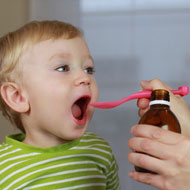Toddler Diarrhea Causes, Symptoms & Treatment
Diarrhea is a common ailment among toddlers between the ages of six months to three years. Diarrhea among toddlers can be attributed to various reasons ranging from viral and bacterial infections to gastrointestinal disorders and food poisoning. Toddler diarrhea can be distinguished as acute diarrhea and chronic diarrhea.
Acute diarrhea in toddlers last up to a week or two while chronic diarrhea in toddlers may last for more than two weeks. The symptoms and causes of toddler diarrhea helps diagnose the health condition of the toddler accurately and decide the treatment accordingly. The key toddler diarrhea causes are:
Toddler Diet
The excess intake of sugar, liquids or carbohydrates can cause diarrhea among toddlers. Low fat diet can also lead to diarrhea among children. A fiber rich diet also helps resolve most issues related to gastrointestinal disorders. Lactose intolerance or inability to digest proteins present in cow’s milk can also trigger diarrhea.
Toddler Food Poisoning
Food contamination and food or water containing certain virus, bacteria or parasites can result in diarrhea among toddlers. Consuming foods contaminated with toxins and pesticides can also affect the digestive system.
Toddler Medications
Intake of certain medications such as antibiotics can also trigger diarrhea among toddlers.
Toddler Bowel Disorders
Certain bowel disorders such as Irritable Bowel Syndrome (IBS) and Inflammatory Bowel Disease (IBD) also lead to diarrhea causing severe symptoms such as bleeding and abdominal cramps.
Toddler Diarrhea Symptoms
The most common symptoms associated with mild to moderate toddler diarrhea are: stomach ache, vomiting, fever and watery diarrhea. Extreme digestive disorders may indicate symptoms such as: bleeding, bloody stools, abdominal cramps, loss of appetite and weight loss.
Treatment for Diarrhea in Toddlers
Simple and common tips can help treat diarrhea in toddlers with mild to moderate diarrhea while extreme symptoms require immediate medical attention. Some common ways to treat diarrhea in toddlers are:
- Reducing intake of sweetened juices
- Reducing intake of sugar and carbohydrates from a child’s diet
- Increase the fat content to provide adequate energy to the child
- Include high fiber foods such as whole grains, fruits, cereals and vegetables with skin.
- Allow the child to recuperate with adequate rest and relaxation
- Consult the doctor regarding any home remedies and diet control being administered to the child
- Replace lost fluids by consuming water and electrolytes to keep the body hydrated and avoid dehydration
- Eat easy to digest foods such as plain rice, fresh fruit juice.
- Avoid intake of fried snacks and oily foods.


